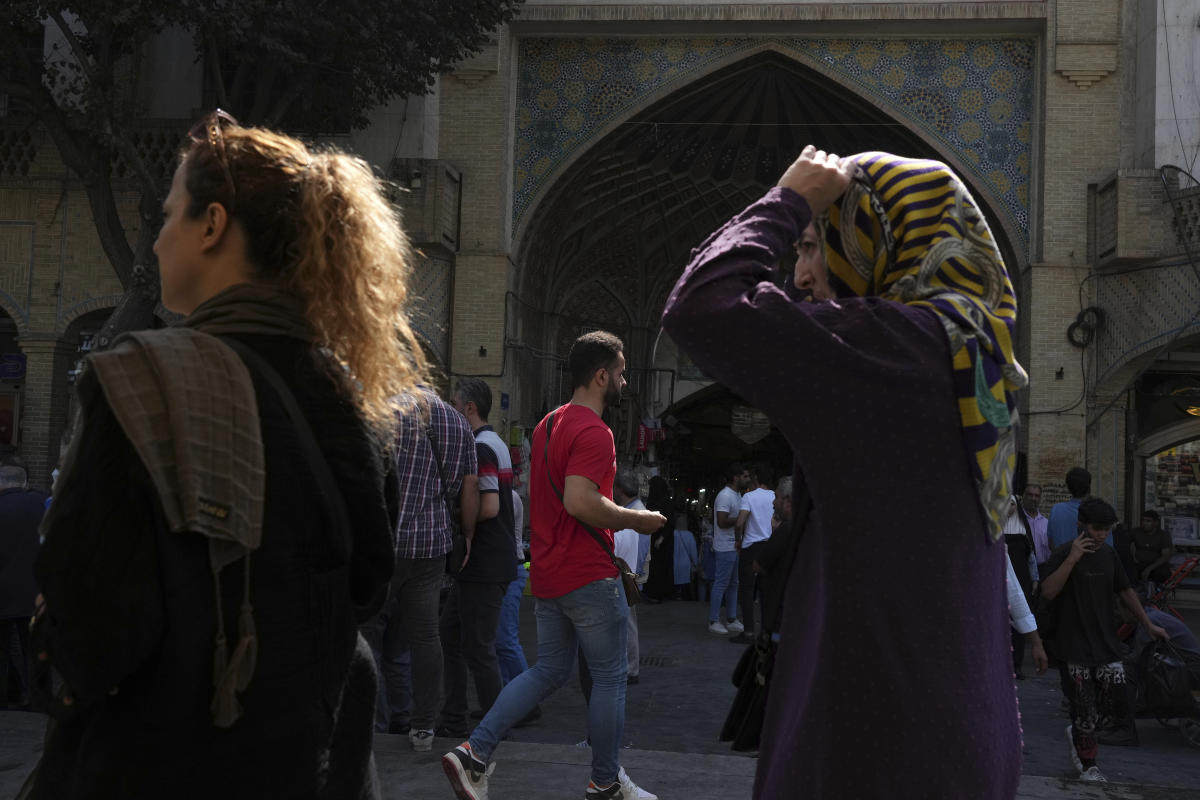
The Biden administration is facing wariness even from some traditional global partners as it tries to get Iran kicked off a United Nations panel that promotes women’s rights, according to four people monitoring the effort.
The U.S.-led effort, inspired by a push from Iranian and other women activists, comes as Iran’s Islamist regime faces protests after the September death of a young woman detained by Iran’s “morality police” for allegedly violating laws that require headscarves and otherwise modest dress. A vote on Iran’s position on the 45-member Commission on the Status of Women is expected on Wednesday.
An ouster would further humiliate Iran’s clerical leaders at a time of already widespread condemnation of their treatment of women and deadly response to protests. The effort could also help boost the Biden administration’s standing among the Iranian people, despite the relatively limited tools it has to pressure the regime.
But the resistance to the U.S. push underscores how tricky a terrain multilateral institutions can be for the United States, despite the Biden administration’s efforts to build U.S. credibility in such forums.
The women’s commission’s past activities include laying the groundwork for a landmark treaty that has served as an international bill of rights for women and pushing countries to update their laws to provide equal rights for women. U.N. documents describe the panel as the “principal global intergovernmental body exclusively dedicated to the promotion of gender equality and the empowerment of women.” Iran began afour-year term on the commission this year.
The U.S. has ledseveral successful efforts to isolate Russia at the United Nations since it invaded Ukraine in February. Moscow has been suspended from the U.N. Human Rights Council and reprimanded by large margins in votes at the U.N. General Assembly.
The dynamics are a bit different with Iran. In this case, America’s detractors fall into three camps: those who felt left out of discussions, those who say it seems arbitrary, and those who worry they’ll be the next U.S. targets.
Some U.N. delegations, including European ones, felt broadsided by the Nov. 2 U.S. announcement that it would make the push — in some cases learning about it through media reports — and wish there had been more consultation, a Western diplomat said.
Other delegations note that many countries beyond Iran have poor records on women’s rights, and they occasionally serve on the commission or other panels that deal with rights issues. Pakistan and Somalia, for instance, also are on the women’s commission, but both countries have deep social inequities when it comes to gender. The signal sent by going after Iran is an inconsistent one, they say.
The third group worries that if such ousters become common practice in the U.N. system, their own governments may become victims of the tactic, according to two U.N. analysts and the Western diplomat.
“I have heard a lot of diplomats say they think Iran’s actions are vile, but they worry that the U.S. will use these exclusionary tactics more in future. One day it’s Iran, the next day it could be you,” said Richard Gowan, a U.N.-focused analyst at the International Crisis Group.
The Western diplomat said that while outsiders may ask why Iran is on the panel at all, within the U.N. system there’s worry about “what distrust might be created” by kicking it off. Many governments are unlikely to announce their official position until the day of the vote, said the diplomat, who like several others in this story spoke on condition of anonymity to describe sensitive diplomatic discussions.
Still, even the holdouts will feel significant pressure, including from outside activists, to go along with the U.S. “This is a proxy vote on whether you stand with the demonstrators or with the government. Most will side against Iran,” the second U.N. analyst predicted.
A draft of the tightly worded resolution to boot Iran from the commission, obtained by POLITICO, accuses Tehran of “administering policies flagrantly contrary to the human rights of women and girls” including “through the use of lethal force.”
A U.S. official familiar with the issue downplayed any potential rifts, saying American representatives as well as civil society activists are working the phones and “seeing support continue to grow every day.”
“The message to these countries is simple: Iran is killing women in the streets for protesting,” the U.S. official said. “This is the right thing to do at the right time.”
The European Union will provide the core bloc of support for the U.S. The women’s commission is an organ of the U.N.’s 54-member Economic and Social Council, and 12 of those members are from the EU. The EU plans to confirm its collective support for the resolution at its weekly coordination meeting of EU ambassadors ahead of the vote, the Western diplomat said.
A State Department official familiar with the issue, however, said that some of the United States’ “normal partners might be more concerned” than usual about the move.
Iran’s delegation to the United Nations has sent a letter to U.N. Secretary General António Guterres and other senior U.N. officials decrying what it termed an “illegal” U.S. effort to push it off the commission based on “false allegations and fabricated assumptions.”
“This illegitimate request indicates yet another attempt by the United States to exploit the U.N. system to further its political agenda,” Amir Saeid Iravani, Iran’s ambassador to the United Nations, wrote in the letter, a copy of which was obtained by POLITICO.
In recent days, Iranian officials have suggested they may relax the enforcement of laws governing women’s dress and halt the operations of the morality police. Still, it’s unclear how far Iranian authorities are willing to go in giving more freedom to women, and such moves may not be enough for many of the protesters who want wholesale regime change.
Acoalition of women’s rights champions, including former Secretary of State Hillary Clinton, entertainment icon Oprah Winfrey andNew Zealand Prime Minister Jacinda Ardern, were among those who joined Iranian women activists this year to call for Iran’s removal from the commission.
“This will not only serve to boost the morale of protesters in Iran, who feel that the international community is abandoning them, but will protect the integrity of the [commission] and the U.N.,” said Nazanin Boniadi, an Iranian-British actress who has been a vocal supporter of the protesters.
Amid the pressure, U.S. officials undertook a legal and procedural analysis, ultimately deciding it was possible to kick Iran off the council. From there, it was “pretty easily decided to proceed,” the State Department official said.
The Biden administration has been pushing the matter at the highest levels. Vice President Kamala Harris announced that the United States would move to expel Iran inan early November statement. A White House official said Harris “has been actively engaged and briefed regularly on our efforts to support the women of Iran, and to hold Iranian officials accountable.”
To pass, the resolution will need a majority of the ECOSOC members present and voting. Abstentions don’t count as votes, but a large number of them could undermine U.S. claims of support.
One reason the U.S. and its allies succeeded in pushing countries off the Human Rights Council, is that there are established procedures fordoing so. Aside from the case of Russia, the U.N. suspended Libya from the council in 2011, when it was led by dictator Muammar Gadhafi amid the Arab Spring uprisings. Libya wasreinstated months later after Gadhafi was killed.
Getting a country expelled from the women’s commission is a more difficult task, because it has rarely, if ever, been tried before, and the exact mechanism for doing so is less clear-cut.




